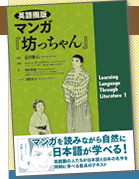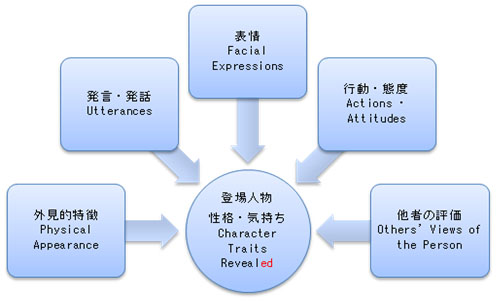第1章の補助教材一覧
ことば・文化ノート1
第1章 <ことば・文化ノート>
登場人物(とうじょうじんぶつ)の性格(せいかく)や気持ちのつかみ方
物語を読む時、登場人物の外見的(がいけんてき)特徴(とくちょう)をつかみ、言ったこと、顔の表情(ひょうじょう)、行動(こうどう)・態度(たいど)、そして他者(たしゃ)からの評価(ひょうか)を観察(かんさつ)し、登場人物の性格や気持ちを理解(りかい)します。例えば、主人公の坊っちゃんが「何を言い、どんな表情をし、どんな行動・動作・態度をとったか」、それについて、「他の人はどう思ったか」を深(ふか)く読んでいくことで、登場人物の性格や気持ちをつかんでいきます。
|
How to understand the personality and feelings of the main characters When we read the story, we need to understand the personalities and feelings of the main characters by observing their distinctive physical features, utterances, facial expressions, actions and attitudes, and comments by others. For example, the readers understand Botchan’s personality and feelings by observing what Botchan said, looked like, did, and what others thought of Botchan’s speech and actions. |
気持ちや様子を表す言葉
| 喜 よろこびHappiness | 怒 いかりAnger | 哀 かなしみSorrow | 怖 おそれFear |
| うれしい幸(しあわ)せ(な) 幸福(こうふく)(な)楽しいありがたい わくわくする 安心する |
くやしい ばかばかしい 腹(はら)が立つ むかつく イライラする |
かなしい さびしい つらい 心苦しいかわいそう(な) 気の毒(どく)(な)情けないみじめ(な) 孤独(こどく)(な)むなしい 後悔(こうかい)する くやむ |
おそろしい こわい 不安(な) 心配(な)(する) おそれるとまどう ひやひやする あせる |
| 驚 おどろき Suprise |
恥 はじ Shame |
愛 あいLove | 嫌 にくしみHatred |
| あっけにとられるあきれるおどろくびっくりする まごつく |
はずかしい てれる はじらう |
いとしい かわいい 好き(な) 愛(いと)しむ 感謝(かんしゃ)する 好(この)む |
憎(にく)い いや(な) きらい(な) うらむ うんざりする むかつく 嫉妬(しっと)する |
❶ 上の表(ひょう)は、気持ちや様子を表(あらわ)す表現(ひょうげん)です。意味を調べて、文を作ってみましょう。The words listed above express feelings and appearances. Let’s look into the meaning of these words.
例:うれしい!(I am happy!) ちょっとイライラしている。(I am a little bit irritated.) 大変感謝します。(I really appreciate [something].) 好きでたまらない。(I cannot help loving.) みじめな気持ちになった。(I started feeling miserable.)
❷ 感情(かんじょう)・気持(きも)ちを間接的(かんせつてき)に表したり、推測(すいそく)したりする時に使う文末(ぶんまつ)表現の例
Examples of sentence-final expressions to describe indirect statements or conjecture.
| Pattern | Meaning | Usage |
| •い-adjective•な-adjective•Verb | Direct Statement | •うらなりはやさしい。Uranari is gentle.•清は心配だ。Kiyo is worried.•坊っちゃんはおどろく。Botchan will be surprised. |
| (plain)+と思う | (I) feel; think | (私は)うらなりはやさしいと思う。I think that Uranari is gentle. (私は) 清は心配だと思う。I think that Kiyo is worried. (私は) 坊っちゃんはおどろくと思う。I feel that Botchan will be surprised. *思う is used for your thoughts and feelings. It is often used at the end of a sentence expressing conjecture, hope, opinion, or argument in order to make the statement softer. |
| (plain)+と考える | (I) consider; think | (私は)うらなりはやさしいと考える。I consider Uranari to be gentle. (私は) 清は心配だと考える。I think that Kiyo is worried. (私は)坊っちゃんはおどろくと考える。I think that Botchan will be surprised. *考えるrefers to the action of thinking, which is the intellectual and mental process of making judgments or forming logical ideas based on reason or sense. |
| (plain)+そう(だ) | People say that〜; I hear that〜 | うらなりはやさしいそうだ。I hear that Uranari is gentle. 清は心配だそうだ。I hear that Kiyo is worried. 坊っちゃんはおどろいたそうだ。People say that Botchan was surprised. |
| (stem)+そう(だ) | It seems to be〜; it seems that〜; I guess that 〜 | うらなりはやさしそうだ。Uranari seems to be gentle. 清は心配そうだ。I guess that Kiyo will be worried. 坊っちゃんはおどろきそうだ。I guess that Botchan will be surprised. *そうだ is based on what the speaker sees or feels, and it is merely his or her guess. |
| (plain negative, dropい) +さそう(だ) | It does not seem to be〜; it does not seem that〜 | うらなりはやさしくなさそうだ。Uranari does not seem to be gentle. 清は心配じゃなさそうだ。Kiyo does not seem to be worried. 坊っちゃんはおどろかなさそうだ。It does not seem that Botchan is surprised. |
| (plain)+らしい* Drop なforな-adjective | It seems to be〜; it seems that〜 | うらなりはやさしいらしい。From what I hear Uranari is gentle. 清は心配らしい。It seems that Kiyo is worried. 坊っちゃんはおどろいたらしい。From what I hear, Botchan was surprised. *らしいexpresses judgment based on evidence, reason or trustworthy hearsay. |
| (plain) +よう(だ)* Keep なforな-adjective |
It seems/appears to be〜; it seems/appears that〜 | うらなりはやさしいようだ。It appears that Uranari is gentle. 清は心配なようだ。It seems that Kiyo is worried. 坊っちゃんはおどろいたようだ。Botchan appears to have been surprised. *ようだ is usually based on what the speaker sees or saw, and involves the speaker’s reasoning process based on firsthand, reliable information and his or her knowledge. |
| (plain)+だろう* Drop なforな-adjective | (I) think; guess; wonder; hope; probably | うらなりはやさしいだろう。I guess that Uranari is gentle. 清は心配だろう。Kiyo is probably worried. 坊っちゃんはおどろくだろう。I think that Botchan will be surprised. *だろう(でしょう = a formal form of だろう) is used when guessing with doubt. |
| (plain)+かなあ* Drop なforな-adjective | (I) wonder; hope; Could it be? | うらなりはやさしいかなあ。I wonder if Uranari is gentle? 清は心配かなあ。Could Kiyo be worried? 坊っちゃんはおどろくかなあ。I wonder if Botchan is surprised. |
| (plain or stem)+に+ちがいない* Drop なforな-adjective | must be | うらなりはやさしいにちがいない。There’s no doubt that Uranari is gentle. 清は心配にちがいない。Kiyo must be worried. 坊っちゃんはおどろくにちがいない。There’s no doubt that Botchan is surprised. |
❸ 気持ちを表してみましょう。
A. 今、あなたはどんな気持ちですか。どんな時に喜(happiness)、怒(anger)、哀(sorrow)、怖(fear)、驚(surprise)、恥(shame)、愛(love)、嫌(hatred)の感情を持ちますか。3つの場面を考えて、その時の気持ちをリストの言葉を使って表現してみましょう。
例:玄関(げんかん)でペットが迎(むか)えてくれる時、とてもうれしくて、ありがたいという気持ちになります。(When my pet welcomes me at the entrance, I feel very happy and thankful.)
B. 同じ場面を使って、家族や友だちの気持ちを推測(すいそく)してみましょう。












